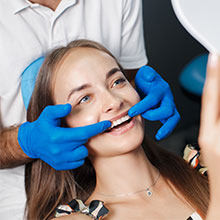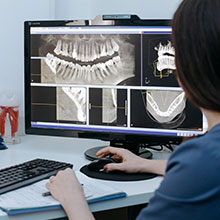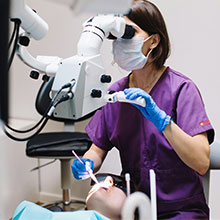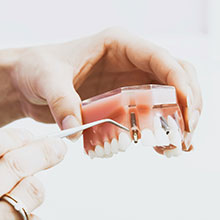Routine Dental Care
A dental exam is an important part of keeping your teeth and gums healthy. During your check-up, the dentist or hygienist will carry out several assessments and treatments to prevent future dental issues and ensure your oral health is in top condition.
Here’s a detailed breakdown of what to expect during your dental check-up, the dentist or hygienist will:
- Check your overall health and oral hygiene
- Look for signs of tooth decay, gum disease, or bone loss
- Assess if you need any tooth repairs or replacements
- Examine your bite and jaw for any issues
- Clean stains or plaque from your teeth
- Show you the best way to clean your teeth or dentures
- Determine if you need fluoride treatment
- Take X-rays or perform other tests if needed
Your dentist will also ask about your health and any medications you take, as some conditions, like diabetes, can increase the risk of gum disease.
Checking Your Overall Health and Oral Hygiene
Your dentist will start by looking at your general oral hygiene, checking for any signs of plaque build up, gum inflammation, or early signs of cavities. They will also ask about your lifestyle habits, such as diet and smoking, which can impact your dental health.
Looking for Signs of Tooth Decay, Root Decay, and Gum or Bone Disease
The dentist will carefully inspect your teeth and gums to detect early signs of decay, infections, or gum disease. Root decay, which can happen as gums recede, is also assessed, as it can lead to serious dental problems if left untreated.
Bone loss, often caused by advanced gum disease, will also be checked.
Assessing the Need for Tooth Restoration or Replacement
If you have damaged, worn, or missing teeth, the dentist will evaluate whether you need treatments such as fillings, crowns, bridges, or dentures.
They will also check the condition of any existing restorations, like fillings or crowns, to ensure they are still in good shape.
Examining Your Bite and Jaw for Any Issues
A misaligned bite can cause discomfort, headaches, and even uneven wear on your teeth. The dentist will check how your teeth fit together and assess your jaw for any potential issues, such as temporomandibular joint (TMJ) problems.
Removing Stains or Deposits from Your Teeth
Over time, plaque and tartar build up on your teeth, which can lead to decay and gum disease. A professional cleaning by the dentist or hygienist helps remove these deposits, keeping your teeth clean and reducing the risk of oral health problems.
They may also polish your teeth to remove surface stains.
Demonstrating Proper Cleaning Techniques for Your Teeth or Dentures
Brushing and flossing the right way is key to keeping your mouth healthy. Your dentist or hygienist will demonstrate the best techniques to clean your teeth effectively, especially if you wear dentures, braces, or have specific areas in your mouth that need extra attention.
Checking If You Need Fluoride Treatment
Fluoride helps strengthen tooth enamel and prevent cavities. Your dentist will assess whether you need additional fluoride treatment, which can be especially helpful for children, individuals prone to cavities, or those with sensitive teeth.
Taking X-rays or Performing Other Diagnostic Tests
If needed, your dentist may take X-rays to check for hidden problems such as cavities between teeth, impacted teeth, bone loss, or infections. These images help detect issues that are not visible during a regular visual exam.
Discussing Your Overall Health and Its Impact on Your Oral Health
Your dentist will ask about any medical conditions or medications you take, as some health issues can affect your oral health. For example, diabetes increases the risk of gum disease, and certain medications can cause dry mouth, which can lead to cavities.
By understanding your medical history, the dentist can provide better care tailored to your needs.
Why Regular Dental Exams Are Important
A dental exam is not just about checking for cavities; it’s a full assessment of your oral health. By attending regular check-ups, you can catch potential problems early, avoid costly treatments, and keep your smile healthy and strong. If your dentist finds any issues, they will discuss the best treatment options with you to prevent further complications.




